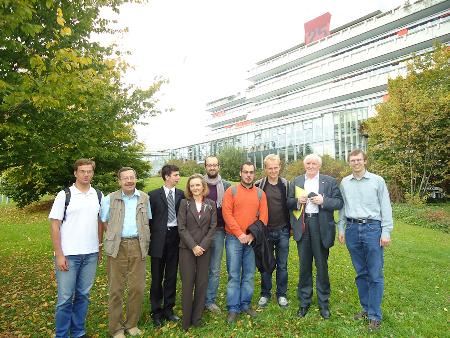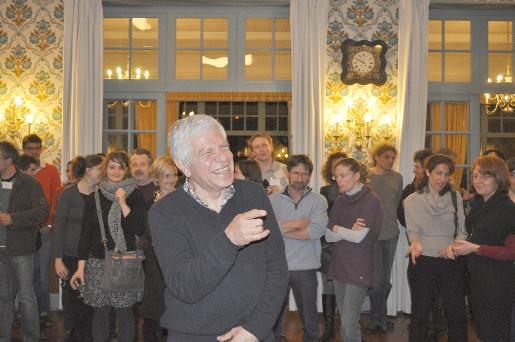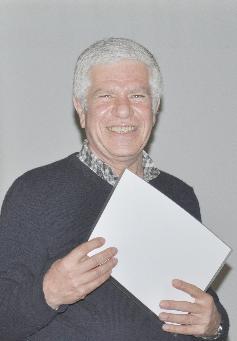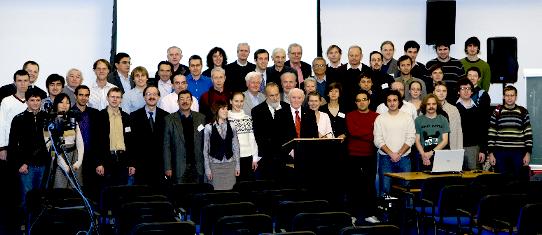|
|
|
Summer School in Stochastic Finance 2010
Young European Queuing Theorists (YEQT IV): Optimal Control in Stochastic Systems
7th International Iranian Workshop on Stochastic Processes
Workshop in honor of Anestis Antoniadis
Young European Probabilists VIII 2011 Subject: Stochastic Models for Population Dynamics
Visions in Stochastics: Leaders and their Pupils
There were 49 participants from several European countries (Belgium, Germany,
Hungary, Italy, Russia, UK).
The scientific program was very intensive. The lecturers and their courses are:
Moreover, there was an additional lecture by A. Shiryaev, entitled “Probabilistic and algorithmic approaches to the concept of randomness” and contributed talks by Soren Christensen (Kiel) and Yaroslav Lyulko (Moscow). The financial support provided by the Faculty of Mathematics and Economics and the International Office of Ulm University is gratefully acknowledged.
This summer school is the second in the series of joint meetings organized in the framework of the cooperation between Lomonosov Moscow State University (Russia) and Ulm University (Germany). The previous summer academy was held in September of 2009 and was devoted to stochastic geometry, spatial statistics, and random fields (organizer E. Spodarev).

The next summer academy will be devoted to stochastic analysis, modeling and simulation of complex structures (organizer V. Schmidt) and is planned for September 2011.
A. Shiryaev, Moscow
M. Urusov, Ulm
EURANDOM – TU/e, November 25-27, 2010
This workshop was organized as the fourth in the series Young European Queuing Theorists (YEQT), organized within the framework of EURANDOM's Queuing and Performance Analysis (QPA) program. The workshop was sponsored by EURANDOM, NWO (Netherlands Organization for Scientific Research), LOIS (Logistics and Information Systems), and STAR (Stochastics-Theoretical and Applied Research).
Within the YEQT series, the first meeting was devoted to transient and asymptotic analysis of queuing systems, the second focused on the stochastic analysis of modern communication networks, and the third one for scheduling and resource sharing in queuing networks. In this fourth meeting, the topic was Optimal Control in Stochastic Systems. Optimal control in stochastic systems is increasingly demanding more research due to their complexity and the inherent randomness encountered within their scopes. A wide variety of mathematical frameworks have been developed to enhance the optimal control of stochastic systems. The focus has been primarily on investigating appealing structures of the optimal policies in various application domains.
The importance of optimal policy structures is twofold; first they provide valuable insight regarding the behavior of the system through easy-to-interpret optimal policies, such as control limit policies. Second, they can be exploited to develop computationally efficient solution algorithms to compute the optimal policies. Optimal control of stochastic systems is of crucial importance across numerous application domains such as manufacturing and production systems, service systems, communication systems, healthcare systems, and logistics. The workshop was very successful and the talks and presentations included excellent balance between theoretical works, and other works that focus on bridging the gap between theory and practice in optimal control. Attendance was quite satisfactory, with a number of attendees ranging between 15-25 for all talks. Discussions and Q&A sessions were quite constructive and inspiring. YEQT IV included the following sets of speakers:
1. Two Keynote Speakers:
• Prof. Chelsea (Chip) White, III Georgia Institute of Technology, USA*
• Prof. Semyon Meerkov University of Michigan Ann-Arbor, USA*
*The above programs possess rankings numbers 1 and 2, respectively, in the US
News ranking of graduate programs in Industrial and Systems Engineering in the
US.
2. Three Tutorial Speakers:
• Prof. Ger Koole, VU Amsterdam, Netherlands
• Prof. Ulrich Rieder, Universität Ulm, Germany
• Bernd Heidergott, VU Amsterdam, Netherlands
3. Fifteen Contributed Speakers:
• Zümbül Atan, TU/e, Netherlands
• Rene Bekker, VU Amsterdam, Netherlands
• Çagdas Büyükkaramikli, TU/e, Netherlands
• Jan-Pieter Dorsman, TU/e - EURANDOM, Netherlands
• Taoying Farenhorst-Yuan, Erasmus University, Netherlands
• Nicolas Gast, Grenoble University – EPFL, France
• Itai Gurvich, Northwestern University, USA
• Rene Haijema, Wageningen Universiteit
• David Hodge, University of Nottingham, UK
• Gerard Hoekstra, Thales Nederland, Netherlands
• Oualid Jouini, Ecole Centrale Paris, France
• Dinard van der Laan, VU Amsterdam, Netherlands
• Flora Spieksma, Leiden University, Netherlands
• Sofia Villar, Carlos III Madrid University, Spain
• Sandra van Wijk, TU/e - EURANDOM, Netherlands
The organizing committee consisted of:
Sandjai Bhulai, Faculty of Sciences, VU University of Amsterdam, the
Netherlands.
Alaa Elwany, Department of Industrial Engineering & Innovation Sciences, Eindhoven University of Technology, the Netherlands.
Patty Koorn, EURANDOM
The 7th International Iranian Workshop on Stochastic Processes (IUST-IWSP7) was held at Iran University of Science and Technology, Tehran, Iran, November 30 and December 1-2, 2010.
The aim of the workshop was to bring together researchers and scientists working in the field of stochastic processes and their applications from academia and industry to exchange research ideas, discuss the most recent advances in all fields that concern with stochastic processes, to disseminate research findings of the participants in the scientific committee, and promote and encourage interaction between faculty from the region and worldwide. Organizing this workshop helped IUST to build bridges with other institution and the community.
The workshop was hosted by the IUST School of Mathematics and Co-sponsored by IPM, the Iranian Statistical Society and Statistical Research Center of Iran.
Technical sponsorship has been provided to the workshop by the IPM (especially by Professor Ahmad Reza Soltani and Professor Said Rezakhah); it exposed researchers from around the world to the high quality of research conducted in this part of the world.
The plenary talks were given by Richard Davis (Colombia University), Bijan Z. Zangeneh (Sharif University), A.R. Soltani (Kuwait University, Shiraz University).
Chairman, Rahman Farnoosh
MASCOT NUM is a french research group on Stochastic Analysis Methods for COdes and NUMerical treatments, supported by CNRS. This year, the annual meeting of the group was held in Villard de Lans, near Grenoble (France) from March 23 to 25. The first day (March 23) was dedicated to the presentations (talks and posters) of PhD students. The prize of best student contribution was awarded to Nathalie Saint-Geours (AgroParisTech, UMR TETIS, Montpellier) for her work Some properties of variance-based sensitivity indices for spatially distributed models.

An opening lecture was given by Jérémie Bigot (Université Toulouse 3) on statistical shape and image analysis. The two other days (March 24-25) were organized in honour of Professor Anestis Antoniadis (Université de Grenoble, France), who is one of the pioneer of our group, and who is a world recognized statistician.

This event gathered more than 110 participants. The Scientific Committee was composed by S. Tsybakov (ENSAE, Chair), P. Cattiaux (IMT, Toulouse 3), F. Gamboa (IMT, Toulouse 3), S. Lambert-Lacroix (Grenoble 2), P. Massart (Paris XI Orsay), C. Prieur (LJK/MOISE, Grenoble 1) and the members of the Organizing Committee were U. Amato (Napoli, Italy), J. Bigot (IMT, Toulouse 3), C. Helbert (LJK/MOISE, Grenoble 2), D. Herzog (INRIAlpes), S. Lambert-Lacroix (Grenoble 2), F. Letué (LJK/SMS, Grenoble 2), E. Maitre (LJK/EDP, Grenoble 1), A. Pierson (MOISE), C. Prieur (LJK/MOISE, Grenoble 1), A. Rousseau (LJK/MOISE, INRIA) and L. Viry (CIMENT/MOISE, Grenoble 1).
The scientific program included nine invited plenary lectures given by
eminent statisticians and/or probabilists
- F. Abramovich, Université of Tel Aviv;
- U. Amato, University of Naples;
- R. Carmona, University of Princeton;
- J. Fan, University of Princeton;
- I. Gijbels, University of Leuven;
- S. Mallat, Ecole Polytechnique Paris;
- M. Pensky, University of Florida Exchange;
- J.M. Poggi, University Paris-Sud;
- V. Spokoiny, WIAS Berlin.
The opening lecture by Umberto Amato on Anestis Antoniadis' scientific life was warmfull and touching, it set the tone for the whole event.
The event was supported by Commissariat à l’Energie Atomique et aux Energies Alternatives (CEA), French National Scientific Research Council (CNRS), European Aeronautic Defence and Space Company EADS, Electricité de France (EDF), Italian National Research Council (IAC), Interuniversity Attraction Pole (IAP), Institut National de Recherche en Informatique et en Automatique (INRIA), Laboratoire Jean Kuntzman (LJK), Société Française de Statistique (SFDS), Unité de Formations et de Recherches en Informatique et Mathématiques Appliquées de Grenoble (UFR IMAG), Grenoble Universities 1 and 2.
Sophie Lambert-Lacroix
Clémentine Prieur
The main focus of the workshop was on “Population Dynamics”, more precisely on stochastic models for population dynamics in ecology and evolution, particularly with a view towards spatial models. Population biology has long been a fruitful source of research problems and inspiration for probabilists, starting with classical branching processes, their diffusion approximations, ranging over interacting particle systems up to measure-valued processes. Processes in biological populations are often very complex and stochastic by nature, thus requiring and inspiring probabilistic modeling. The situation becomes especially intriguing when the role of space is taken into account, where this can refer to geographical space, with the two dimensional space being biologically most interesting and also posing the toughest mathematical challenges, or to a more abstract 'type space' or possibly to a combination of both. Examples of important questions that mathematical models can help to attack are in how far spatial distribution can promote survival of a population or coexistence of various types, how the populations tend to arrange themselves in space, or how new species can emerge through the interplay of mutations and competition of different types. In this workshop we focused on such mathematical questions addressing challenging problems at the interface between probability theory and population dynamics. The workshop consisted of three courses, two problem sessions and 13 contributed talks.
Course 1: Limit theorems for voter model perturbations
Speaker: Ted Cox (Syracuse)
Course 2: Population dynamics and evolution in the trait space
Speaker: Amaury Lambert (Paris)
Course 3: Temporal and spatial scales in geographically structured
population models
Speaker: Amandine Veber (Paris)
Problem session 1: Stochastic models in Ecology and Evolution
Speaker: Patsy Haccou (Leiden)
Problem session 2: Problems in population genetics involving selection,
recombination and migration
Speaker: Feng Yu (Bristol)
Patty Koorn, Eurandom

1st – 3rd November, 2010, the Steklov Mathematical Institute (Moscow) played as host for the International Symposium “Visions in Stochastics”. The idea of organizers was to collect together leaders of some directions in Stochastics and their students, coworkers, pupils.
Among 50 min plenary speakers (“leaders”) were: A. Bulinski, A. Dorogovtsev,
E. Eberlein, H.-J. Engelbert, Yu. Kabanov, U. Küchler, H. Ouerdiane, G. Peskir,
E. Valkeila, V. Vatutin, E. Yarovaya.
20 min contributed talks were presented by (“pupils”): E. Azmoodeh, M. Bedini,
S. Blei, E.Vl. Bulinskaya, J. Grépat, H. Mai, A. Muravlev, A. Papapantoleon, J.
Sexton, A. Shamov, A. Shashkin, T. Sottinen, H.Tikanmäki, M. Urusov.
18 poster presentations were made. 4th of November was the day of excursions (Red Square, Kremlin, the Tretyakov Gallery).
Shiryaev, A. Muravlev, T. Tolozova